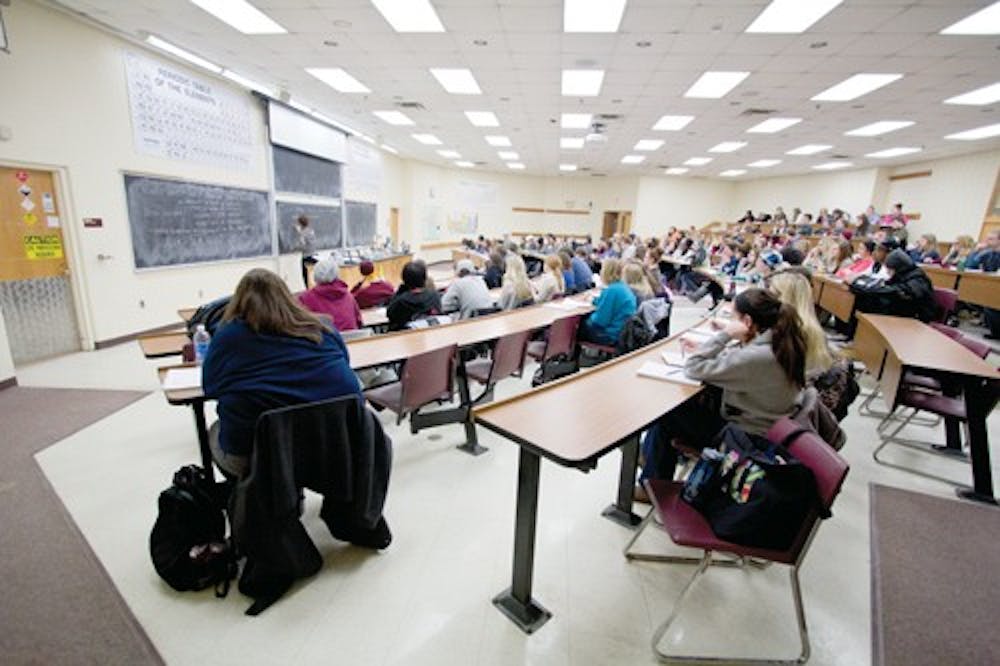CHM 101 cancelled for Fall 2014: Professors say new active learning rooms to blame
Katherine Blystone has been teaching chemistry at Central Michigan University for over 20 years, but next semester, she'll have to forfeit one of her courses due to a miscommunication over the the university's active learning room project.
Armchair Chemistry, designated as CHM 101 and typically taught in Dow 135 will be put on a temporary hiatus until the course can be "reconstructed" to be compatible with the active learning classrooms.The classrooms will be converted from two different Dow Hall rooms, including Room 135, a chemistry lab.
Blystone said plans for the active learning rooms and the class cancellations were made without faculty consent.
"This whole project blindsided us," Blystone said. "(The active learning rooms) were never discussed with the faculty, we never even knew about the blueprints."
One of the main reasons the classes were cancelled was the incompatibility of the rooms and the required safety measures needed to run a chemistry lab. These measures require access to wash sinks, safety showers and storage space for hazardous chemicals needed to carry out CHM 101 experiments.
Designs for the active learning rooms did not include these features, Blystone said.
A total of $1.5 million in university funding was allocated for the active learning rooms by Central Michigan University Board of Trustees in February. The project is being funded by the College of Science and Technology, the Academic Division Fund and the University Reserve Fund.
The active learning rooms are in essence modified lecture halls built around a central podium. The goal is to facilitate more communicative learning interactions between professors and students. Rooms will be outfitted with USB connections in the desks and a collection of display monitors.
While Blystone and other chemistry professors have called foul on administrators, others within the College of Science and Technology said faculty members were as informed as they could.
“It was done as timely (and transparently) as we could have done it,” said David Ash, chair of the chemistry department.
Provost Michael Gealt declined comment for this story and directed interview requests to Ian Davison, dean of the College of Science and Technology.
Davison also was unavailable for comment.
In order to adjust to the new active learning classrooms, the CHM 101 courses will be modified to be compatible with the new facilities. The only major at CMU which requires the course is the Bachelor of Science in Education.
In conjunction with the facility modifications, the course is being augmented to better fit the degree and the needs of students, too.
“We realized that the audience was a wad of students who wanted to be elementary school teachers,” said Jane Matty, associate dean of the CST. “They will not be taking toxic chemicals, flames, liquid nitrogen and things (used in CHM 101) into elementary school classrooms.”
According to Matty, when students first began registering for classes for the Fall semester, CHM 101 was not available.
Alternatives to the course are available
The course is a popular option under University Program II-B requirements. Three sections are usually available with between 100 to 130 openings per section. Since it was not listed, students had to choose a different class to fulfill the requirement.
Blystone said students were not offered any notification from the university that the course would be cancelled.
For those education students who need the class for their major, alternatives are offered through CHM 111 and CHM 120. Matty said both of the alternatives are not much more difficult than CHM 101 and both are designed for those without prior experience in chemistry.
“The only difference is, students who need lab credit would need to enroll separately in the CHM 127 lab,” Matty said. “But there will be extra sections of that offered as well.”
Matty added the department's goal was to ensure the course remains just as effective as it was before, but safer with the elimination of different safety hazards and waste.
Ash was unsure whether any additional equipment would be installed in different classrooms to accommodate this new direction the CHM 101 courses are going in and that the future of the program remains a bit unclear as it will continue to be revised.
Although this change could have a negative effect on students and some faculty members now, Matty added that many in the department are excited for the new rooms.
Another concern among chemistry faculty members is the symbolic meaning of the cancellation. Blystone said some have taken offense that Dow 135 - dedicated to grandfather of armchair chemistry, L. Michael Carson - will no longer serve chemistry students.
Both Ash and Matty said they expect the class to return to Dow Hall, and quite possibly in the same room.
“There are many long-term benefits,” Matty said. “Thousands of students will benefit from the active learning rooms.”
In the interim, Blystone has been offered an additional course, at least until CHM 101 courses are reinstated in Spring 2015. Even with the assurances that CHM 101 courses will resume next spring, she's worried about the class' future.
“I’m not against the active learning classrooms, just with the way this was handled,” Blystone said. “(The course) shows (students) practical application and when it’s used in real world situations. I strive for that."
According to Steve Lawrence, associate vice president of facilities management, work to begin transitioning the rooms into active learning classrooms will begin the week of May 12 and will be completed by the end of July.




